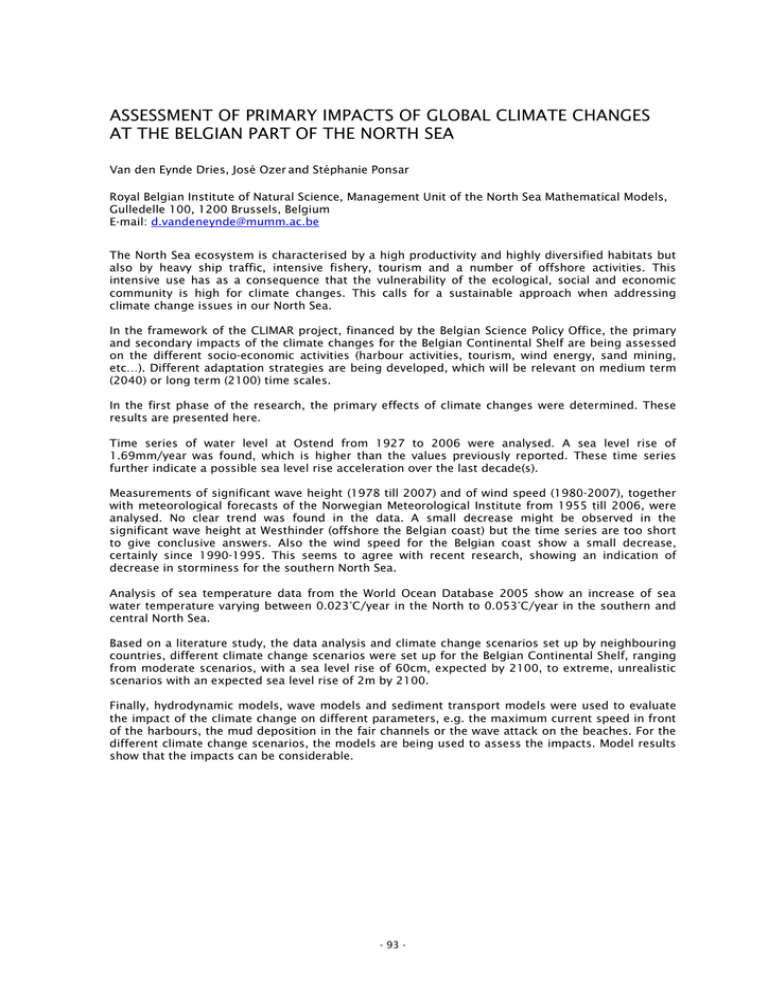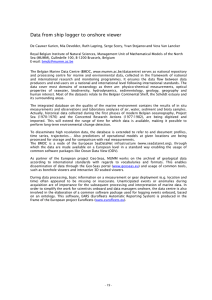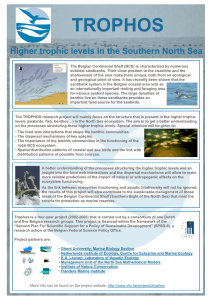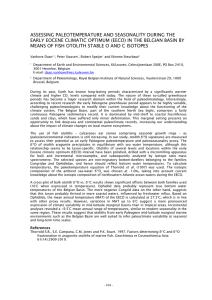ASSESSMENT OF PRIMARY IMPACTS OF GLOBAL CLIMATE CHANGES
advertisement

ASSESSMENT OF PRIMARY IMPACTS OF GLOBAL CLIMATE CHANGES AT THE BELGIAN PART OF THE NORTH SEA Van den Eynde Dries, José Ozer and Stéphanie Ponsar Royal Belgian Institute of Natural Science, Management Unit of the North Sea Mathematical Models, Gulledelle 100, 1200 Brussels, Belgium E-mail: d.vandeneynde@mumm.ac.be The North Sea ecosystem is characterised by a high productivity and highly diversified habitats but also by heavy ship traffic, intensive fishery, tourism and a number of offshore activities. This intensive use has as a consequence that the vulnerability of the ecological, social and economic community is high for climate changes. This calls for a sustainable approach when addressing climate change issues in our North Sea. In the framework of the CLIMAR project, financed by the Belgian Science Policy Office, the primary and secondary impacts of the climate changes for the Belgian Continental Shelf are being assessed on the different socio-economic activities (harbour activities, tourism, wind energy, sand mining, etc…). Different adaptation strategies are being developed, which will be relevant on medium term (2040) or long term (2100) time scales. In the first phase of the research, the primary effects of climate changes were determined. These results are presented here. Time series of water level at Ostend from 1927 to 2006 were analysed. A sea level rise of 1.69mm/year was found, which is higher than the values previously reported. These time series further indicate a possible sea level rise acceleration over the last decade(s). Measurements of significant wave height (1978 till 2007) and of wind speed (1980-2007), together with meteorological forecasts of the Norwegian Meteorological Institute from 1955 till 2006, were analysed. No clear trend was found in the data. A small decrease might be observed in the significant wave height at Westhinder (offshore the Belgian coast) but the time series are too short to give conclusive answers. Also the wind speed for the Belgian coast show a small decrease, certainly since 1990-1995. This seems to agree with recent research, showing an indication of decrease in storminess for the southern North Sea. Analysis of sea temperature data from the World Ocean Database 2005 show an increase of sea water temperature varying between 0.023°C/year in the North to 0.053°C/year in the southern and central North Sea. Based on a literature study, the data analysis and climate change scenarios set up by neighbouring countries, different climate change scenarios were set up for the Belgian Continental Shelf, ranging from moderate scenarios, with a sea level rise of 60cm, expected by 2100, to extreme, unrealistic scenarios with an expected sea level rise of 2m by 2100. Finally, hydrodynamic models, wave models and sediment transport models were used to evaluate the impact of the climate change on different parameters, e.g. the maximum current speed in front of the harbours, the mud deposition in the fair channels or the wave attack on the beaches. For the different climate change scenarios, the models are being used to assess the impacts. Model results show that the impacts can be considerable. - 93 -











